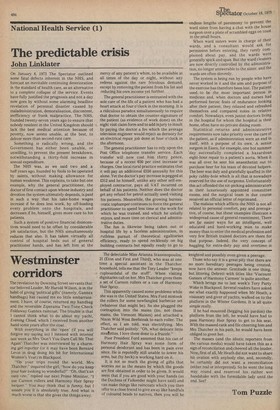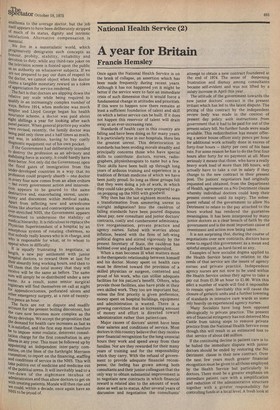National Health Service (1)
The predictable crisis
John Linklater
On January 6, 1973 The Spectator outlined some fatal defects inherent in the NHS, and forecast an inevitable continuing deterioration in the standard of health care, as an alternative to a complete collapse of the service. Events have fully justified the prognosis and not a day now goes by without some alarming headline revelation of personal disaster caused by maladministration, demoralisation, discontent, inefficiency or frank malpractice. The NHS, founded twenty-seven years ago to ensure that nobody resident in the United Kingdom should lack the best medical attention because of poverty, now seems unable, at the best, to deliver more than second-rate care.
Something is radically wrong, and the Government has either been unable, or unwilling, to prevent the present breakdown, notwithstanding a thirty-fold increase in annual expenditure, The NHS was, as we said two and a half years ago, founded by fools to be operated by saints, without making allowance for human weakness. This explains, to take but one example, why the general practitioner, the doctor of first contact upon whose industry and devotion the system ultimately depends, is paid in such a way that his take-home wages increase if he does less work, by off-loading every problem onto the hospitals, and decreases if he, himself, gives more care to his patients.
Such a system of positive financial disincentives would need to be offset by considerable job satisfaction, but the NHS simultaneously reduces that also. It has taken virtually all control of hospital beds out of general practitioner hands, and has left him at the mercy of any patient's whim, to be available at all times of the day or night, without any redress against the rare frivolous demand, except by removing the patient from his list and reducing his own income yet further.
The general practitioner is entrusted with the sole care of the life of a patient who has had a heart attack at four o'clock in the morning. It is a ridiculous paradox simultaneously to require that doctor to obtain the counter-signature of the patient (as evidence of work done) on the night visit claim form and to add injury to insult by paying the doctor a fee which the average television engineer would reject as derisory for an electrical repair job done at four o'clock in the afternoon.
The general practitioner has to rely upon the Post Office telephone transfer service. Each transfer will now cost him thirty pence, because of a recent 650 per cent increase in charges. One local rural practice estimates that it will pay an additional £550 annually for this alone. Yet the doctor's pay increase is pegged at £312 and he himself, unlike any other self-employed contractor, pays all VAT incurred on behalf of his patients. Neither does the doctor get any refund for petrol actually used visiting his patients. Meanwhile, the growing bureaucratic tophamper continues to force the general practitioner to spend less time at the work for which he was trained, and which he usually enjoys, and more time on clerical and administrative duties.
The fun is likewise being taken out or hospital life by a faceless administration, in ruthless pursuit of theoretical egalitarian efficiency, ready to spend recklessly on big building contracts but equally ready to go to endless lengths of parsimony to prevent the ward sister from having a chat with the house surgeon over a plate of scrambled eggs on toast in the small hours.
When ward sisters were in charge of their wards, and a consultant would ask for permission before entering, they rarely complained about pay, and the wards were generally spick and span. But the ward cleaners are now directly controlled by the administration, no longer answerable to the sister, and the wards are often slovenly.
The system is being run by people who have never worked in it and the aim and purpose of the exercise has therefore been lost. The patient used to be the most important person in medicine and, when doctors and nurses had performed heroic feats of endurance looking after their patient, they relaxed and refreshed themselves and compared notes in relative comfort. Nowadays, even junior doctors living in the hospital for whom the hospital is their home, often have no private dining room.
Statistical returns and administrative requirements now take priority over the care of the patient, as if administration were an end in itself, with a purpose of its own. A senior surgeon in Essex, for example, one hot summer 'day successfully completed a hazardous eight-hour repair to a patient's aorta. When it was all over he sent his anaesthetist out to purchase beer for his team of devoted helpers. The beer was duly and gratefully quaffed in the poky cubby-hole which is all that is nowadays reserved for the use of surgeons. Unfortunately this act offended the nit-picking administrators in their luxuriously appointed committee rooms, and the surgical team in due course received an official letter of reprimand.
The malaise which afflicts the NHS is not all related to personal comfort, pay and prerogative, of course, but these examples illustrate a widespread cause of general resentment. There are far easier ways for an intelligent, well educated and hard-working man to make money than to enter the medical profession and very few British trained doctors are there for that purpose. Indeed, the very concept of haggling for extra-duty pay and overtime is anathema to the average doctor, but the job itself appears to have been deliberately stripped of much of its status, dignity and intrinsic satisfaction. Alternative compensation is essential.
We live in a materialistic world, which Progressively denigrates such concepts as honour, probity, stability, reliability and devotion to duty, while any third-rate joker on the television screen is foisted upon the public as an authority on whatsoever subjects. If we are not prepared to pay our dues of respect to the doctor, we cannot object when the doctor claims a tangible monetary reward as a token of appreciation for service rendered.
The fact is that doctors are slipping down the relative pay scale while being required to qualify in an increasingly complex number of Ways. Before 1914, when medicine was much simpler and Lloyd George began his health insurance scheme, a doctor was paid about eight shillings a year for looking after each Panel patient. When general practice pay scales were revised, recently, the family doctor was being paid only three and a half times as much, and was, in addition, having to buy costly diagnostic equipment out of his own pocket. If the Government had deliberately intended to destroy the profession as an advisory and stabilising force in society, it could hardly have done better. Not only did the Government open the flood gates of immigration from the under-developed countries in a way that no Profession could properly absorb — one doctor in every four now comes from an alien colture but every government action and intervention appears to be geared to the same destructive end, exacerbating unrest, uncer411,, MY and discontent within medical ranks. 'Part from inflicting new and unwelcome duties like abortion and contraception upon an °yet-stretched NHS, the Government appears determined to undermine the stability of Medical hierarchy. It is ridiculous to replace the Physician Superintendant of a hospital by an amorphous system of rotating chairmen, so that nobody really knows who is in charge, and Who is responsible for what, or to whom to appeal when in difficulty. It is equally frustrating to negotiate, at length, a new pay settlement with junior hospital doctors, to reward them at last for their absurdly long working hours, and then to tell them that the total money that they will receive will be the same as before. The same sum will simply be re-distributed under a new name. As a result, some senior surgical registrars will find themselves on call at night for appendicectomies, perforated ulcers and ,O.ther emergency surgery, at a rate of twentyrive pence an hour.
The facts are not in dispute and readily account for the present boiling discontent, but the cure now becomes more complex as the decay develops. We accept the proposition that the demand for health care increases as fast as it issatisfied, and the first step must therefore he to impose some realistic, deterrent consultation charge for the first consultation in any illness in any year. This must be followed up by appointing an independent inter-party comnuttee, on the lines of the forthright Merrison committee, to report on the financing, staffing and conditions of service in the NHS. This will take politics out of medicine and medicine out of the political arena. It will inevitably lead to a run-down of the nightmare incubus of administrators and thus allow doctors to get on With treating patients. Morale will then rise and we could, within a decade, once again have an NHS to be proud of.



































 Previous page
Previous page